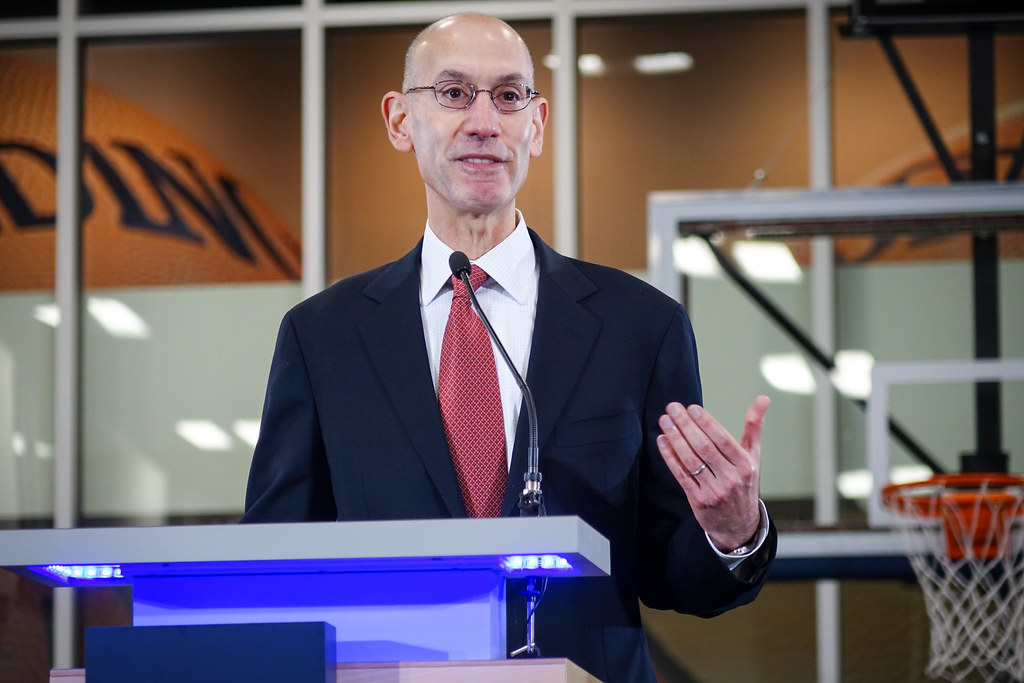Unveiling The Tenure Of Sports League Commissioners: A Tech-Thrills Guide
"Which sports league's commissioner's last" is a question that refers to the tenure of the highest-ranking executive of a professional sports league. For instance, Adam Silver has been the commissioner of the National Basketball Association (NBA) since 2014.
This inquiry holds significance because the commissioner plays a pivotal role in shaping the league's policies, strategies, and overall direction. Their decisions impact player salaries, team operations, and the fan experience.
Historically, the tenure of commissioners has varied widely. Some, like Pete Rozelle of the NFL, have held their positions for decades, while others have served for shorter periods. The length of a commissioner's tenure can influence the league's stability, continuity, and ability to adapt to changing circumstances.
- Antron Brown Wife Billie Jo Brown Married
- Get To Know Tiania Haneline Her Boyfriend
- French Montana Says Max B Might Be
- Tim Sebastian Married Spouse Marital Life Relationship
- Jordan Hill Net Worth Age Height Bio
Which Sports League's Commissioner's Last
Understanding the key aspects of "which sports league's commissioner's last" is crucial because it sheds light on the tenure and impact of the league's highest-ranking executive.
- Tenure length
- Leadership style
- Policy decisions
- Player relations
- League growth
- Financial stability
- Fan engagement
- Historical significance
These aspects are interconnected and influence the overall success and legacy of a sports league. For example, a commissioner with a long tenure may have a greater impact on the league's development, while a commissioner with a strong leadership style may be more effective in navigating challenges and implementing new initiatives. Ultimately, understanding these key aspects provides a deeper insight into the dynamics and evolution of professional sports leagues.
Tenure length
Tenure length, a key aspect of "which sports league's commissioner's last," refers to the duration of time an individual holds the position of commissioner in a professional sports league. It is a significant factor that can influence the league's stability, continuity, and overall success.
- Chuck Todd And Wife Kristian Todd Married
- Meet The Late Ray Liotta S Daughter
- Bishop Briggs Husband Did Not Propose Her
- Ify Nwadiwe And Wife Aurora Has A
- Connor Payton Is Sean Payton S Son
A longer tenure typically provides the commissioner with more time to implement their vision for the league, build relationships with key stakeholders, and navigate the challenges that arise in the ever-evolving sports landscape. For example, David Stern's 30-year tenure as commissioner of the NBA is widely credited with transforming the league into a global sports powerhouse.
Conversely, a shorter tenure may limit the commissioner's ability to make a lasting impact on the league. They may face challenges in establishing their authority, implementing long-term initiatives, or building consensus among the league's owners and players. For instance, Roger Goodell's tenure as commissioner of the NFL has been marked by controversy and criticism, leading to calls for his resignation.
Understanding the connection between tenure length and "which sports league's commissioner's last" is crucial for assessing the commissioner's role in shaping the league's history and direction. It also provides insights into the challenges and opportunities that commissioners face during their time in office.
Leadership style
Leadership style is a crucial aspect of "which sports league's commissioner's last" as it shapes the commissioner's approach to managing the league, interacting with stakeholders, and making decisions that impact the league's direction.
- Visionary Leadership
Visionary leaders have a clear and compelling vision for the future of the league. They inspire others to embrace their vision and work together to achieve it. David Stern, former commissioner of the NBA, is an example of a visionary leader who transformed the league into a global brand.
- Collaborative Leadership
Collaborative leaders foster a culture of teamwork and inclusivity. They value input from others and seek consensus in decision-making. Adam Silver, current commissioner of the NBA, is known for his collaborative leadership style.
- Autocratic Leadership
Autocratic leaders make decisions unilaterally and expect others to follow their directives. They may be effective in crisis situations or when quick decisions are needed. However, this style can stifle creativity and motivation.
- Transformational Leadership
Transformational leaders inspire and motivate others to perform beyond expectations. They create a positive and empowering work environment. Pat Riley, former president of the Miami Heat, is an example of a transformational leader who led the team to multiple NBA championships.
Understanding the leadership style of a commissioner provides insights into their decision-making process, their ability to manage conflict, and their effectiveness in building relationships with key stakeholders. It also sheds light on the commissioner's approach to innovation, risk-taking, and the overall direction of the league.
Policy decisions
Policy decisions are central to the role of a sports league commissioner, as they shape the league's operations, player welfare, and fan experience. Commissioners are responsible for developing and implementing policies that govern various aspects of the league, including:
- Competition rules
Commissioners set the rules and regulations that govern how games are played, including player eligibility, game format, and scoring systems. For example, the NBA's commissioner has the authority to adjust the rules related to instant replay and player conduct.
- Player safety
Commissioners prioritize player health and safety by implementing policies that aim to reduce the risk of injuries and protect player well-being. The NFL's concussion protocol is an example of a policy that has been shaped by the commissioner's commitment to player safety.
- Financial regulations
Commissioners oversee the league's financial health and stability by establishing policies related to revenue sharing, salary caps, and player contracts. The NHL's salary cap system is an example of a policy that has been implemented to ensure competitive balance among teams.
- Fan engagement
Commissioners recognize the importance of fan engagement and develop policies that enhance the fan experience. The NBA's "One and Done" rule, which requires players to be at least 19 years old and one year removed from high school before entering the draft, is an example of a policy that has been influenced by the desire to improve the quality of play and increase fan interest.
These policy decisions have a profound impact on the game, the players, and the fans. They reflect the commissioner's priorities and vision for the league, and can shape its trajectory for years to come.
Player relations
Player relations, an integral aspect of "which sports league's commissioner's last," encompass the dynamic interaction between the commissioner and the players in the league. It involves fostering a positive and collaborative relationship that benefits both parties and the league as a whole.
- Collective bargaining
Commissioners play a crucial role in collective bargaining negotiations between the league and the players' union. They represent the league's interests while striving to reach fair and equitable agreements that address player concerns and ensure the long-term health of the sport.
- Player discipline
Commissioners have the authority to discipline players for violations of league rules and policies. They must balance the need to maintain order and protect the integrity of the game with the goal of providing players with due process and fair treatment.
- Player development
Commissioners are committed to player development both on and off the field. They support initiatives that enhance player skills, promote education, and provide resources for personal growth and well-being.
Effective player relations foster trust, respect, and open communication between the commissioner and the players. This collaboration leads to better decision-making, improved player morale, and a stronger league overall. Conversely, strained player relations can create conflict, division, and damage the league's reputation.
League growth
League growth, a pivotal aspect of "which sports league's commissioner's last," refers to the expansion and development of a sports league across various dimensions, encompassing fan base, revenue streams, global reach, and competitive landscape.
- Fan base expansion
A commissioner can implement strategies to attract new fans and increase the league's popularity, such as expanding into new markets, promoting the sport through social media, and enhancing the fan experience at games.
- Revenue growth
The commissioner oversees the league's financial health and can drive revenue growth through initiatives such as securing lucrative broadcast deals, developing new sponsorship opportunities, and exploring international markets.
- Global reach
Commissioners play a role in expanding the league's global footprint by organizing international games, partnering with foreign leagues, and promoting the sport worldwide.
- Competitive balance
The commissioner can implement rules and regulations that promote competitive balance, such as salary caps, draft lotteries, and revenue sharing, ensuring that multiple teams have a fair chance of success.
League growth is essential for the long-term success and sustainability of a sports league. A commissioner who successfully fosters league growth not only increases the league's popularity and revenue but also strengthens its position in the global sports landscape and enhances the overall experience for fans and players alike.
Financial stability
Financial stability is a cornerstone of "which sports league's commissioner's last." A financially stable league provides a solid foundation for growth, innovation, and long-term success. It allows the commissioner to make strategic decisions that enhance the league's competitiveness, fan engagement, and overall reputation.
Financial stability is critical for a commissioner's ability to negotiate favorable television deals, secure lucrative sponsorships, and explore new revenue streams. A financially stable league can also invest in infrastructure, technology, and player development programs, which further contribute to the league's overall health and sustainability.
Real-life examples abound of financially stable sports leagues. The National Football League (NFL) is one of the most financially successful sports leagues in the world, generating billions of dollars in revenue each year. The NFL's financial stability has allowed it to expand into new markets, launch new initiatives, and provide generous benefits to its players. Similarly, the English Premier League (EPL) has experienced tremendous financial growth in recent years, attracting global sponsorships and broadcasting deals that have made it one of the most lucrative soccer leagues in the world.
Understanding the connection between financial stability and "which sports league's commissioner's last" is essential for anyone interested in the business of sports. It highlights the importance of sound financial management, strategic planning, and revenue diversification in ensuring the long-term health and success of a sports league.
Fan engagement
Fan engagement is a crucial aspect of "which sports league's commissioner's last" as it encapsulates the strategies and initiatives implemented by commissioners to enhance the overall experience for fans and foster a deep connection between them and the league. By engaging fans, commissioners aim to increase viewership, ticket sales, merchandise revenue, and ultimately, the popularity and profitability of the league.
- Interactive experiences
Commissioners can introduce interactive experiences such as virtual reality broadcasts, mobile apps with personalized content, and live Q&A sessions with players and coaches, allowing fans to feel more connected to the game and the league.
- Fan recognition programs
Recognizing and rewarding loyal fans through programs such as loyalty clubs, exclusive merchandise, and special events shows appreciation and creates a sense of community among fans.
- Community involvement
Commissioners can foster fan engagement by encouraging teams and players to actively participate in community events, charity initiatives, and youth development programs, demonstrating the league's commitment to social responsibility and connecting with fans on a personal level.
- Personalized content
Providing fans with personalized content tailored to their interests and preferences, such as customized highlights, player interviews, and behind-the-scenes footage, enhances their enjoyment and makes them feel more invested in the league.
Fan engagement is a multifaceted aspect of "which sports league's commissioner's last" that requires commissioners to be creative, innovative, and responsive to the evolving needs and expectations of fans. By successfully engaging fans, commissioners can create a loyal and enthusiastic fan base that drives the growth and success of the league.
Historical significance
Historical significance is deeply intertwined with "which sports league's commissioner's last," shaping both the trajectory and legacy of a commissioner's tenure. The actions, decisions, and achievements of commissioners throughout history have left an enduring impact on the sports landscape.
Commissioners play a pivotal role in shaping the historical narrative of their respective leagues. For instance, Pete Rozelle's 30-year tenure as commissioner of the NFL transformed American football into a national pastime. His leadership oversaw the AFL-NFL merger, the implementation of instant replay, and the expansion of the league to new markets. Rozelle's legacy continues to shape the NFL today, as his vision for the sport's growth and popularity laid the foundation for its current success.
Understanding the historical significance of commissioners' decisions provides valuable insights into the evolution of sports leagues. By examining past events and their impact, stakeholders can gain a deeper appreciation for the challenges and opportunities faced by commissioners, and the consequences of their choices. This knowledge can inform present-day decision-making and contribute to a more informed and nuanced understanding of the sports industry.
In summary, historical significance is a critical component of "which sports league's commissioner's last." It serves as a roadmap to understanding the evolution of sports leagues, the impact of commissioner leadership, and the broader societal and cultural context in which sports are played and enjoyed.
Frequently Asked Questions about Which Sports League's Commissioner's Last
This FAQ section aims to address common questions and clarify key aspects of "which sports league's commissioner's last." It provides concise answers to anticipated reader queries, offering a deeper understanding of the topic.
Question 1: What is the significance of commissioner tenure length?
Answer: Tenure length influences a commissioner's impact on league stability, policy implementation, and overall direction. Longer tenures allow for greater influence and continuity, while shorter tenures may limit a commissioner's ability to make lasting changes.
Question 2: How does a commissioner's leadership style affect the league?
Answer: Leadership style shapes a commissioner's decision-making, conflict management, and stakeholder relationships. Visionary leaders inspire innovation, collaborative leaders foster teamwork, autocratic leaders prioritize control, and transformational leaders motivate exceptional performance.
Question 3: What are the key policy decisions made by commissioners?
Answer: Commissioners establish policies governing competition rules, player safety, financial regulations, and fan engagement. These policies impact game play, player welfare, league finances, and the overall fan experience.
Question 4: How do commissioners manage player relations?
Answer: Player relations involve collective bargaining, player discipline, and player development. Commissioners must balance league interests with player concerns to foster a positive and collaborative relationship.
Question 5: What strategies do commissioners use to promote league growth?
Answer: League growth encompasses fan base expansion, revenue growth, global reach, and competitive balance. Commissioners implement strategies such as market expansion, fan engagement initiatives, international partnerships, and salary regulations to drive league development.
Question 6: Why is financial stability crucial for sports leagues?
Answer: Financial stability provides a foundation for growth, innovation, and long-term success. It enables commissioners to negotiate favorable deals, secure sponsorships, and invest in infrastructure and player development, ultimately enhancing the league's competitiveness and fan appeal.
These FAQs provide valuable insights into the multifaceted role of sports league commissioners. Understanding these aspects deepens our appreciation for the challenges and opportunities commissioners face, and the impact their decisions have on the sports landscape. As we delve into the next section, we will explore the historical significance of commissioners and their lasting legacies on the leagues they lead.
Tips for Understanding Which Sports League's Commissioner's Last
This section provides practical tips to enhance your understanding of commissioners' tenures and their impact on sports leagues.
Tip 1: Examine tenure length and its implications for league stability and policy implementation.
Tip 2: Analyze leadership styles and their influence on decision-making, stakeholder relations, and league direction.
Tip 3: Review key policy decisions, such as competition rules, player safety regulations, and financial policies, to grasp their impact on league operations.
Tip 4: Evaluate player relations management, including collective bargaining, player discipline, and player development initiatives, to assess commissioner effectiveness in fostering a positive player-league relationship.
Tip 5: Study league growth strategies, such as fan base expansion, revenue generation, global reach, and competitive balance initiatives, to understand how commissioners drive league development.
Tip 6: Assess financial stability and its significance for sports leagues, considering factors such as revenue streams, cost management, and investment in infrastructure and player development.
Tip 7: Explore the historical significance of commissioners, examining their legacies and the lasting impact of their decisions on the evolution of sports leagues.
These tips empower you to delve deeper into the complexities of commissioner leadership and its multifaceted impact on sports leagues.
In the concluding section, we will synthesize these insights to provide a comprehensive understanding of the role and responsibilities of sports league commissioners, highlighting the significance of their tenure, leadership, and decision-making in shaping the sports landscape.
Conclusion
Our exploration of "which sports league's commissioner's last" has illuminated the multifaceted role and responsibilities of these league leaders. The tenure length and leadership style of a commissioner significantly influence their impact on the league's stability, direction, and player relations. Key policy decisions, such as those governing competition rules, player safety, and financial regulations, shape the league's operations and fan experience.
Furthermore, commissioners play a pivotal role in driving league growth through strategies aimed at expanding the fan base, generating revenue, and enhancing global reach. Financial stability is paramount for sports leagues, providing the foundation for growth, innovation, and long-term success.
Understanding the historical significance of commissioners and their lasting legacies allows us to appreciate the evolution of sports leagues and the enduring impact of their decisions. As we move forward, the role of sports league commissioners will continue to be crucial in shaping the future of their respective leagues and the sports landscape as a whole.
- Meet Olivia Palermo Parents Douglas Palermo Lynn
- Jon Batiste Bio Age Parents Wife Children
- Utah Ivana Meandzija Missing Or Found Case
- Brantley Gilbert Age Net Worth Kids Weight
- Rapper Lloyd Is A Father Of Two

Which sports league's commissioner’s last name can be found on the

Which sports commissioner's last name found on periodic table?

Which sports commissioner's last name found on periodic table?